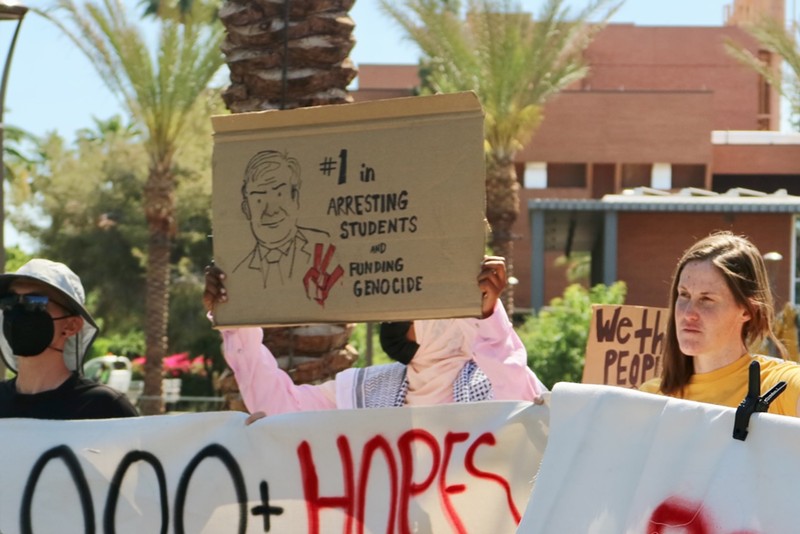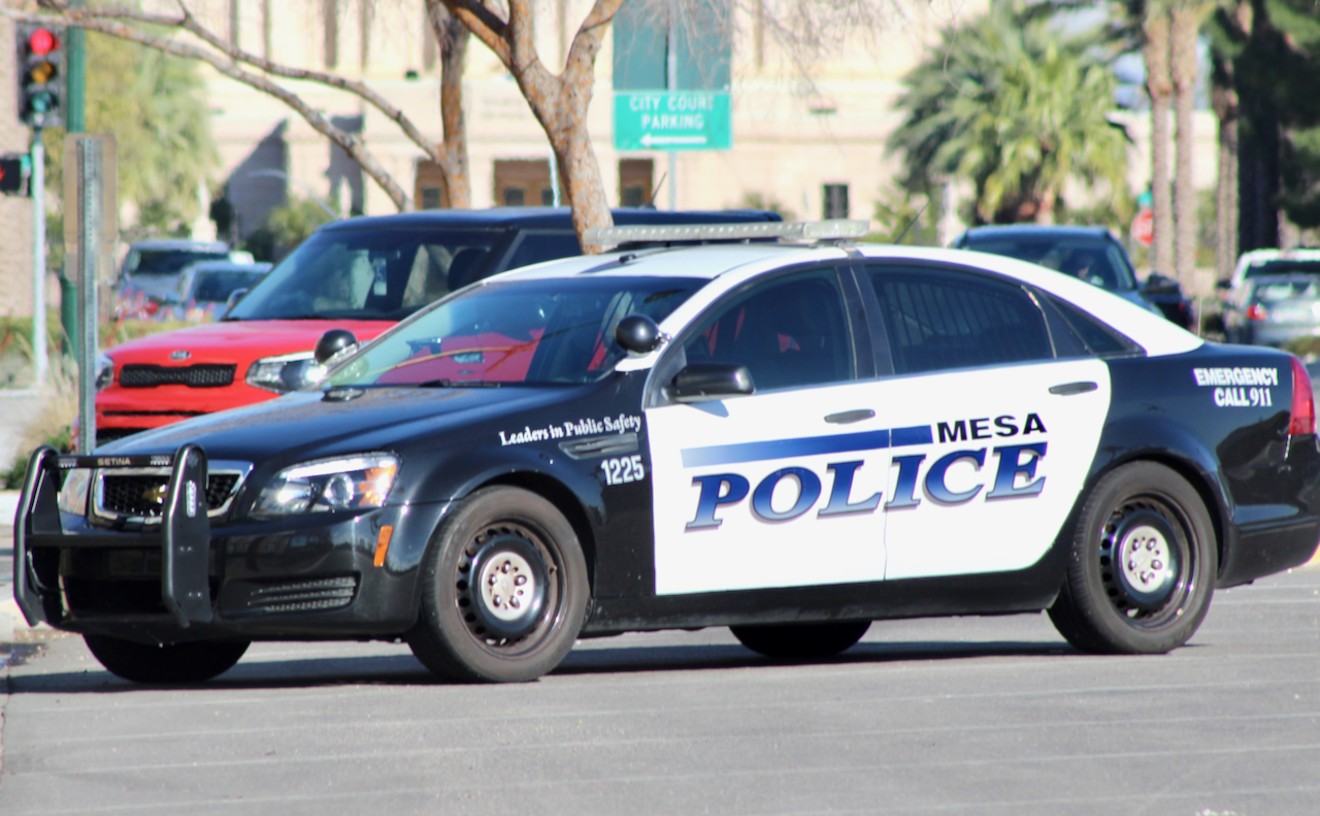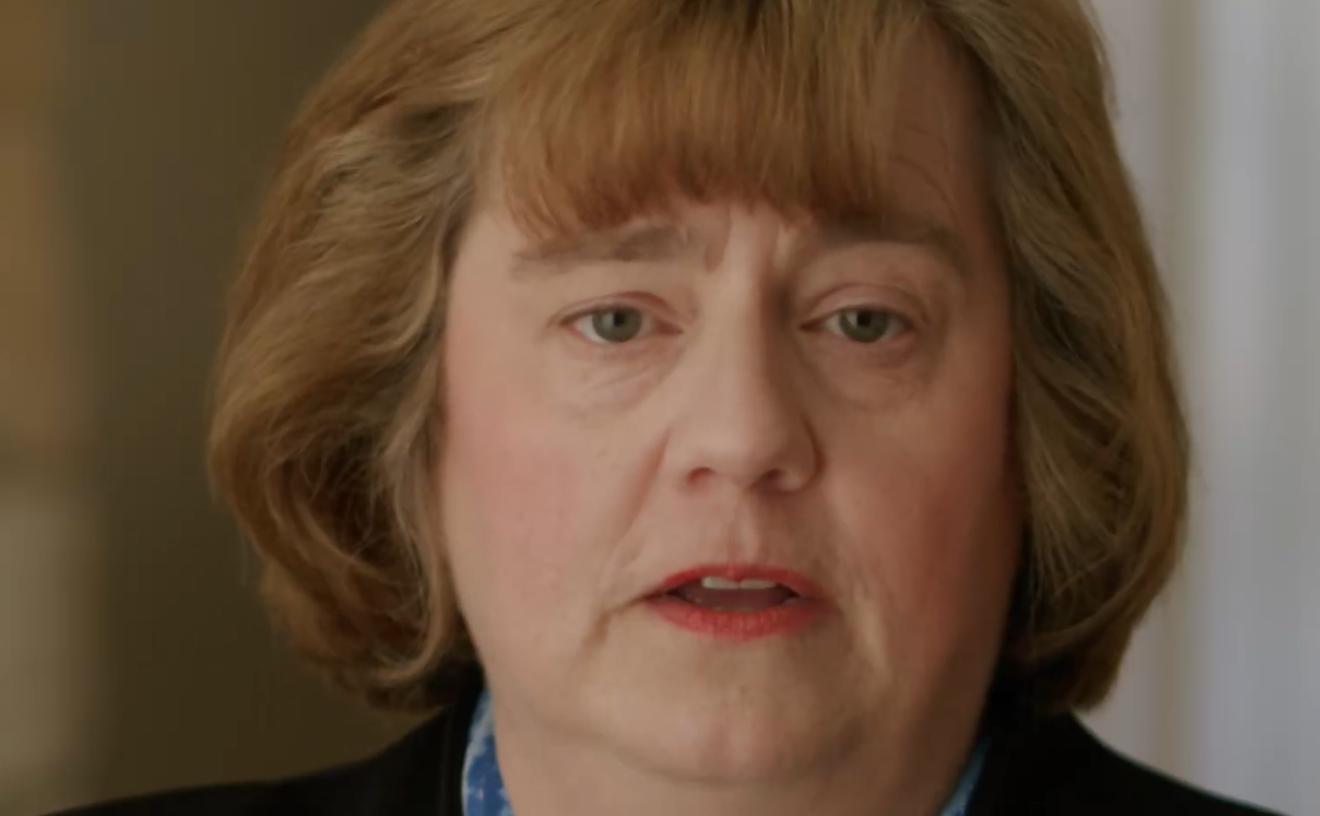Across the country, colleges and universities are facing a consequential test. As pro-Palestinian protests have roiled campus after campus, school administrators have called in the cops to crack down on student expression. While some protests have been less peaceful than others — students protesting what they've called Israel’s genocidal offensive in Gaza have occupied and vandalized university buildings at both Columbia and UCLA — there's a common thread between them:
An overwhelming response from police.
Though tensions haven’t run as high in Arizona, the state’s three public universities have been just as happy to sic police on their own students. At the University of Arizona in Tucson, police arrested about 70 protesters conducting a sit-in on campus, deploying physical force and chemical irritants on the orders of the school’s president, Robert Robbins. At Northern Arizona University in Flagstaff, police arrested 24 people Tuesday, including 22 students. In an Instagram post, protesters could be heard chanting, “There’s no riot here, why are you in riot gear,” as police moved in.
The largest number of arrests, however, were made at Arizona State University in Tempe. On April 26, protesters led by a group called Students Against Apartheid set up an encampment in the evening on the lawn outside Old Main. By the next morning, campus police in riot gear, aided by troopers from the Arizona Department of Public Safety and deputies from the Maricopa County Sheriff’s Office, had arrested 72 of the protesters.
The officers were less than tactful. An ABC15 camera caught ASU Police Chief Michael Thompson out of uniform and brandishing a knife as he destroyed protestors’ tents. The media outlet also obtained video of police forcibly removing the hijabs of several Muslim women — who "begged for 'humanity,'" their attorney told the Arizona Republic — in an apparent civil rights violation reminiscent of one that recently cost New York City $17.5 million.
And though it’s been nearly a week since the arrests, not a single arrested protester has been charged with a crime.
Three protesters arrested April 26 were released after University Lakes Justice Court Judge William Cawthon ruled they were detained without probable cause, according to court documents. The other 69 have been accused of trespassing but are currently stuck in legal limbo. The charge is a class 3 misdemeanor that typically does not result in jailing, though nearly all protesters arrested early Saturday were held in custody until later that evening. The Maricopa County Attorney's Office makes charging decisions, but County Attorney Rachel Mitchell said Thursday that she hadn't received the necessary documents from police to determine if protesters will be charged.
While the legal system may grind slowly, ASU apparently doesn’t. The university quickly excised arrested students from campus life, suspending them and barring them from finishing classes, communicating with professors and entering their own dorm rooms. On Tuesday, lawyers for 20 of the students — including one who was immediately released due to a lack of probable cause — filed a First Amendment lawsuit in federal court against the Arizona Board of Regents, as well as a motion for a preliminary injunction to reverse what it called “enforced homelessness and automatic class failure.”
David Chami, one of the lawyers for the students, told Phoenix New Times that by arresting and punishing the students, ASU was attempting “to crush their spirit and to strip them of their constitutional rights to free speech and to assemble.”
“I think that it’s abhorrent and it’s against everything we’re supposed to stand for as Americans,” Chami added.
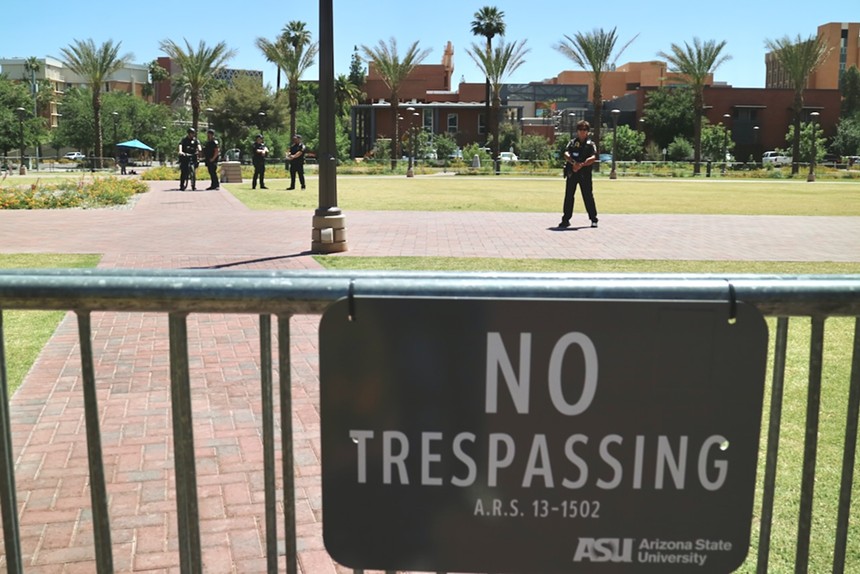
Arizona State University placed police and private security in charge of keeping students off Alumni Lawn, a central point in campus, to prevent further protests. Officers patrolled the ground on Thursday.
TJ L'Heureux
‘Disproportionate response’
Chami was hardly alone in expressing alarm.At a gathering Thursday in Tempe, Michael Kintscher of United Campus Workers was among several students, alumni and faculty who spoke out against the university’s heavy-handed approach to policing speech. “The use of violence and institutional discipline to disrupt a peaceful peaceful student demonstration violates students’ constitutionally protected right to free speech and assembly on public property,” Kintscher said.
The forced removal of hijabs — apparently committed by ASU police, although the agency has not responded to many outlets asking it to confirm its involvement — trampled the First Amendment in another way, said Azza Abuseif, the executive director of the Muslim civil rights advocacy organization Council on American-Islamic Relations.
“The First Amendment guarantees the free practice of religion. Police cannot suspend this right,” Abuseif said. “We condemn the reported actions of ASU police and call for a full investigation into this incident.”
In a statement, the university said encampments are against school policy and claimed that only 15 of those arrested were ASU students. But protesters said that claim is false and was made several hours before police checked arrestees’ academic status. Twenty students are party to the lawsuit filed against the Board of Regents, and a group protesting the school’s response Thursday claimed that 27 students, along with several staff and alumni, were arrested.
The 20 students suing the Board of Regents, and perhaps other students who were arrested, are now facing consequences from the university despite not having been charged with a crime. Suspended students may appeal their punishments but must submit that request to the Office of Student Rights and Responsibilities before midnight on Saturday. The legal system may get there first: a hearing on the students' motion for a preliminary injunction is set for Friday afternoon at the Sandra Day O'Connor U.S. Courthouse.
Speaking to reporters at the gathering Thursday, ASU alumnus Tarteel Alimam decried the school’s “disproportionate response.”
“To punish these students, to threaten their academic careers and jeopardize their futures would not only be unjust, but would also send a chilling message that dissent and activism are not welcome or tolerated within our academic institutions,” Alimam said.
At other campus protests, police have adopted a similar “arrest first, justify it later” approach to quelling free speech. At a University of Texas protest, a judge dismissed charges against 57 arrested protesters because, as the Austin American-Statesman reported, “police ‘copied and pasted’ each probable cause affidavit for every person arrested.” Such shortcuts don’t fly, Mitchell told reporters Thursday.
“You can't lump people together,” Mitchell said. “You have to show that a particular individual committed particular acts that constitute a crime.”
In deciding whether to charge ASU’s protesters, Mitchell said there will be “immediate higher-up involvement in reviewing the cases for charges” once ASU police file arrest paperwork.
On that score, though, the county attorney's office doesn’t have the best track record. In 2021, under Mitchell’s predecessor, charges against anti-police brutality protesters were fabricated by prosecutors and the Phoenix Police Department, who colluded to convince a grand jury the protesters were a gang that was as dangerous as the Bloods. The case fell apart.
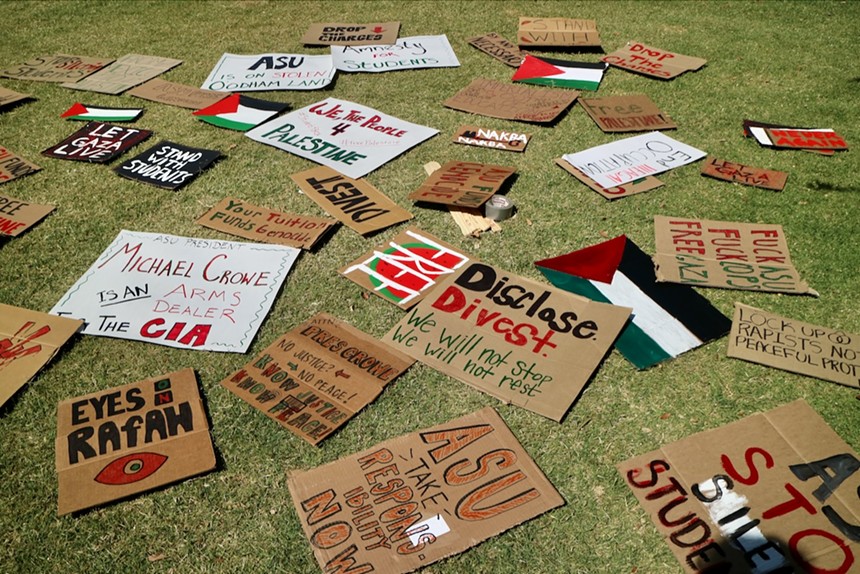
Signs at Arizona State University's Tempe campus on Thursday protesting Israel's mass killing of civilians, women and children in Gaza.
TJ L'Heureux
Why they’re protesting
What drew protesters to Old Main — and to conduct campus sit-ins across the country — was the carnage of Israel’s military campaign in Gaza. Launched in response to Hamas’ Oct. 7 terrorist attack that killed 1,200 Israelis and abducted at least 200 more, the war has raged for nearly seven months and resulted in the deaths of more than 34,000 Gazan civilians, two-thirds of whom have been women and children.Despite that, the U.S. government has continued to supply Israel with military aid. So, unable to sway their elected officials, campus protesters are trying to exert what influence they have over their academic institutions.
Aside from general calls for a ceasefire, protesters at ASU and elsewhere have called for their universities to sever financial ties that might provide aid to Israel, including divesting from companies and funds that generate profits directly or indirectly as a result of the Israeli Defense Force’s campaign. ASU, for instance, has an endowment fund of more than $1.5 billion that it invests in stocks, bonds and other financial securities. Protesters are demanding that money isn’t used to invest in the perpetration of mass killing.
“ASU is destroying our investments in our education for exercising our constitutional rights to speak up against genocide,” the students arrested wrote in a statement. They called on ASU to “divest from all of its financial ties to the state of Israel, as well as companies supplying the Israeli military for its brutal actions towards the people of Gaza.”
The BDS movement — boycott, divestment and sanctions — dates back to 2005, though it has yet to generate much traction. Thirty-eight states, including Arizona, have since passed laws prohibiting state governments from investing in companies that support BDS or from doing business with contractors that support a boycott of Israel. But in the wake of recent protests, at least some colleges have signaled a willingness to discuss the subject of divestment.
ASU, apparently, is not. They called the cops instead.
“It is reprehensible that instead of choosing to come to the table to discuss their community’s concern, ASU’s administration decided to respond with unnecessary and overwhelming force," the arrested students said.
Stephen Lemons contributed to this report.

